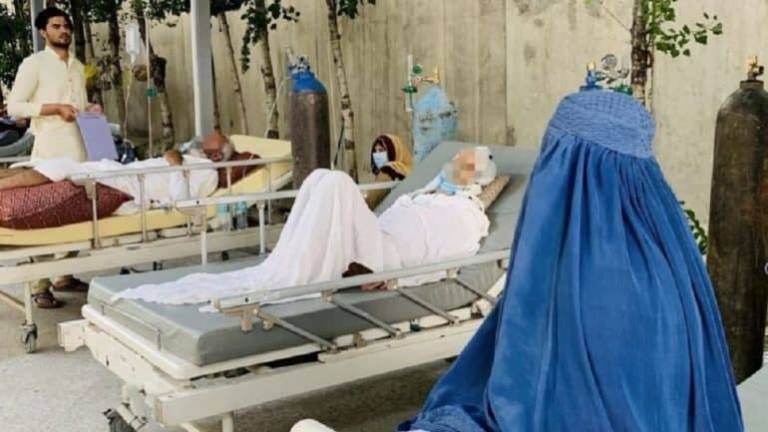As the Covid-19 pandemic began to spread across the country, Afghan health management, with the help of World Health Organization (WHO), took initiative to train and prepare health workers for challenges related to Covid-19 disease. As part of the initiative, the Afghan ministry of public health undertook training programs for the intensive care unit (ICU) community to cope with the then less known fatal pandemic disease.
Documents obtained by Kabul Now show that many ICU practitioners who were working in the frontline of Covid-19 during the first wave of the pandemic were undertrained, a problem that increased the risk of death of Covid-19 patients. Most health workers who were working at Covid-19 health facilities attended an eight-day training on intensive care management of corona disease. This training was coordinated by the Afghan ministry of public health and facilitated by WHO. Documents show that only two days of the training were given to introduction and methods of operating ventilators while in a number of provinces the training was conducted few months after the delivery of ventilators. Some untrained and inexperienced health workers, totally unfamiliar with the operation of ventilators, were hired in most Covid-19 centers, as the documents suggest.
Prior to the outbreak of coronavirus, a ventilator, a machine that helps patients with a high degree of Covid-19 to take breaths, was unknown medical equipment.
Some health officials say that roughly 90 percent of patients with Covid-19, who were connected to ventilators, lost their lives. A report published by Afghanistan Ombudsperson Office (AOO) on July 23, 2020, shows that almost all major hospitals, including Afghan-Japan health facility, Mohammad Ali Jenah Hospital, Sheikh Zayed Hospital, Sardar Daud Khan hospital, and Khair Khana health facility, Mir Ebrahim Basim hospital in Herat and Nangarhar Hospital, were equipped with ventilators. The report by AOO also suggests that a number of patients with Covid-19, who were connected to ventilators to take breathe, have lost their lives.
Out of 40 patients with Covid-19, 39 reportedly lost their lives while connected to ventilators at Mohammad Ali Jenah, with only a single patient getting recovery. In Herat, out of 60 patients with Covid-19, who were connected to ventilators, 58 lost their lives. Out of four Covid-19 patients, who were connected to ventilators, only one survived in Nangarhar.
Out of 45 patients with Covid-19, who were reported in dire need of ventilators, 35 passed away. In the first six months of the coronavirus outbreak in Nangarhar, out of nine, seven patients with Covid-19 lost their lives while connected to ventilators.
Figures shared by Mohammad Ali Jenah Hospital, show that out of 4,520 patients admitted to the hospital from May 06 to August 21, 310 passed away.
Noor Hassan, a health official in Nangarhar hospital, said that the two-day training organized by WHO was not sufficient. A full operation of the device requires practical work while in the two-day training we learned basic things about the devices, he said.
A number of health officials from various provinces share similar experiences. Gul Karim Karim, in-charge of Covid-19 management in the central Ghor, says the training held by the WHO helped learn introductory things about the operation of the devices.
Though some reports suggest that a large number of patients with Covid-19, connected to ventilators, lost their lives, perhaps due to mal-operation of the devices, Sayed Jawid Akbari, chief physician at Mohammad Ali Jenah Hospital, denied the reports, saying ICU practitioners at the hospital had enough expertise about the usage of ventilators.
The MoPH says that with help from the WHO it held training for 535 ICU practitioners.
A report by AOO released in July last year claimed that though the MoPH had a number of ventilator devices in its store it wanted to purchase 510 new ventilators from Germany.
The ministry reported that there were 1,200 ventilators in use across the country, of which 117 were in use by Covid-19 care facilities.
Mr. Karimi claimed that health authorities appointed some unfit staff with no relevant work experience at Ghor Covid-19 hospital. He claimed that a student was appointed as a doctor and an officer as a nurse.
Noor Hassan, a doctor working at Covid-19 hospital in Nangarhar, complained that fresh graduates with no experience in the field of medical work were appointed at the hospital. “They could not use medical equipment,” he said.
A report by AOO shows that a large number of people with irrelevant work backgrounds were appointed as health workers in many hospitals. For instance, a law graduate was appointed as head of doctors at Covid-19 hospital in Nangarhar and a middle school student was appointed as a supervisor at Afghan-Japan Hospital.
This report has financially been sponsored by the European Union (EU). The Daily Etilaat-e-Roz is responsible for the content of this story which does not necessarily reflect the EU’s opinion.




